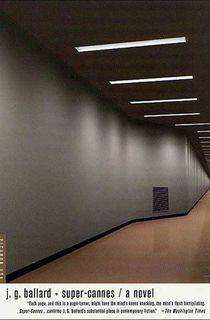Since cementing himself in the world of speculative fiction—particularly in terms of the cross-section of technology, mass media, and violence—author J.G. Ballard has examined many of the principle themes of social horror.
From exploring social stratification to the influence of social media (or in the pre-social media era). Ballard’s characters are often under the surveillance of an ever-present media awareness that influenced personal motivations. His work is rife with all the integral elements of social horror.
Let’s take a look at some of Ballard’s most notable descents into societal madness.

Kingdom Come
For his last novel, Ballard went all-out anarchy, effectively channeling the essence of mass-scale consumerist violence. An advertising executive named Richard Pearson becomes unemployed at the same time, his father is killed in a shopping mall, gunned down by someone at the height of a psychotic break. It turns out that this is not an isolated incident; in fact, the suburbs are brimming with a madness fueled by rabid violence built around insane consumerism. Ballard tosses it all in, every breed of social horror from shootings and riots to vandalism and heated political protest.
Considered one of his more contentious novels, Kingdom Come feels as much like a novel on the brink as our current sociopolitical climate.

Millennium People
In some ways a complementary novel to Kingdom Come, Millennium People is about the middle class rising up in a fury of rebellion. David Markham is a psychologist who loses his wife in an accident, a bomb going off near the airport. He finds out that the bomb is just the tip of the proverbial iceberg. Britain’s middle class is bored with, well, being bored and they seek a sort of violent organized chaos, their act of anarchism—not unlike Project Mayhem from Chuck Palahniuk’s Fight Club—a means of erasure and defiance of the society’s systems that have morally corrupted and "jailed them."

Crash
This work is what Ballard will always be known most for, Crash is transgressive social horror at its bleakest and most perverse. But in case it’s new to you: Crash is about a man named James Ballard who meets the mysterious and troubled Vaughan, who leads him into an underworld of perversion. Vaughan calls himself a “TV scientist,” which any reader nowadays would translate as a self-proclaimed obsessive of media and consumerism.
Vaughan belongs to a cultish group of people that get off on car crashes, each dreaming of their own death by way of a collision. Vaughan wants his death to come from a massive car crash with actress and model Elizabeth Taylor. James Ballard gets swept up in the obsession, conjuring up the brink of allure and aversion.

High-Rise
My personal favorite of his novels, High-Rise has since been adapted into a film of the same name by director Ben Wheatley. The premise is devilishly simple, a high-rise becomes the setting of a deconstruction of order and civility, the existence of peak convenience becoming a trigger point for a return to primal rage. It’s Lord of the Flies by way of Snowpiercer.
Here we see social stratification literally numbering the floors or stories of the high rise counting up, each more “lucrative” and “higher class” than the ones below it. Yet as you climb, you are losing access to many of the conveniences, as well as a way out of the building. Ballard clearly had a lot of fun here exploring the then (and maybe still?) hyper-modern concept of a high-rise residential tower.

Cocaine Nights
With a title like that, you might think this one goes into the realm of other transgressive fiction like American Psycho, and you wouldn’t be wrong. Ballard goes more psychological thriller with Cocaine Nights. At the center of the story is the Club Nautico, a posh and swanky upscale social club, the sort that you’d expect the rich and elite to do lines, talk business, and seek out increasingly odd vices.
Charles Prentice is lured to the world of the elite after his brother, Frank, the club manager willingly confesses to arson and homicide. What’s so odd is how he willingly takes on the punishment; Charles digs deeper and finds that the “odd vices” surrounding Club Nautico turn out to be far more indulgent and murderous.
If you recently watched Infinity Pool, you might get a kick out of what Ballard did decades ago with this novel.

Super-Cannes
By now, it’s pretty clear that at the core of Ballard’s breed of social horror is one of consumerism, decadence, and technology. Super Cannes is considered a complementary novel to the aforementioned Cocaine Nights.
Paul and Jane Sinclair move to an upscale private community called Eden-Olympia, where Jane is taking over for a doctor that recently went on a suicidal killing spree. Of course, this private community is so idyllic and perfect that something is festering underneath. The doctor’s killing spree isn’t a freak accident. Paul becomes consumed with figuring out what went wrong in the community, and as he does, he becomes witness to a society that has given in full to their creature comforts to the point of destruction, both of the self and of the community at large.





